Genetics and Culture Symposium | Participants
Panelists
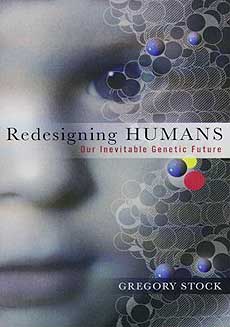 |
Dr. Gregory Stock is the Director of the Program on Medicine, Technology, and Society at UCLA’s School of Medicine. In this role he explores critical technologies poised to have large impacts on humanity’s future and the shape of medical science. His goal has been to bring about a broad public debate on these technologies and their implications, leading to wise public policies surrounding their realization. Of particular interest to the program are the implications for society, medicine, and business of the human genome project and associated developments emerging from today’s revolution in molecular genetics and bioinformatics. The symposium he convened two years ago on the possibilities of manipulating the genetics of human embryos drew international attention as the first major public discussion of this issue among distinguished scientists and opened a global debate on this hitherto taboo topic. A prolific author and recognized authority on the impact of new technologies on human society, Dr. Stock this year edited “Engineering The Human Germline: An Exploration of the Science and Ethics of Altering the Genes We pass to Our Children”. His newest work, “Redesigning Humans: How Technology Will Redefine the Human Form and Character,” will be published in 2002. http://research.mednet.ucla.edu/pmts/redesign.htm Dr. Stock has long explored fundamental issues of human life and values. Among his other books is the best seller, “The Book of Questions”, which has been translated into seventeen languages, and is now in its fifty-fifth printing. Sequels to the book include “The Book of Questions: Business, Politics, and Ethics” and a new book that will explore how coming technologies will reshape our everyday lives. Dr. Stock has been an invited speaker to numerous academic, government, and business conferences, and was asked to submit an Advisory Memo to President William Clinton on the challenges of the next century. He makes regular appearances on television and radio, including CNN, PBS, and the BBC, and will be hosting a television series next year on the implications of recent research to retard human aging. Gregory Stock has a Doctorate in Biophysics from Johns Hopkins University, and an MBA from Harvard University. For additional information: http://research.mednet.ucla.edu/pmts/Stock.htm |
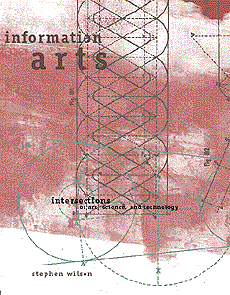 |
Stephen's interactive installations & performances have been shown internationally in galleries and SIGGRAPH, CHI, NCGA, Ars Electronica, and V2 art shows. His computer mediated art works probe issues such as World Wide Web & telecommunications; artificial intelligence and robotics; hypermedia and the structure of information; GPS and the sense of place; synthetic voice; and biological & environmental sensing. He won the Prize of Distinction in Ars Electronica's international competitions for interactive art and several honorary mentions. He is Head of the Conceptual/Information Arts program at San Francisco State University. He was selected as artist in residence at Xerox PARC and NTT Research labs. He has been a developer for Apple, Articulate Systems and other companies and principal investigator in National Science Foundation research projects to investigate the relationship of new technologies to education. His new book called "Information Arts: Intersections of Art, Science and Technology" published by MIT Press in November, 2001 surveys artists, theorists, and researchers working in advanced inquiries in fields such as biology, medicine, physics,artificial life, telepresence, body sensors, vr, artificial intelligence, and information systems. |
 |
|
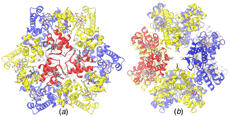 |
Cheryl holds an MA in English literature, and a PhD in molecular biology. In addition to doing her research, she has taught an interdisciplinary course entitled "The Genome: Blueprint, Controversy, Destiny". The course explores a broad range of topics related to the Human Genome Project, with special emphasis on hands-on laboratory work. Topics discussed included the way that DNA encodes the blueprint of cells and multicellular organisms, the impact of the Human Genome Project on society, the use of DNA analysis in forensics, the relationship of genomes to biotechnology, new reproductive technologies("designer genes"), genetically modified foods, and the role of genomes as a basis for new insights into evolution. Students participate in a genome sequencing research project, and learn hands-on experience in cutting-edge techniques in molecular biology, including DNA isolation and sequencing, genome analysis, microscopy and bacteriology. |
 |
Natalie is an artist who works with the net, computer games and other popular media. She will be releasing her newest project, "MetaPet" on April Fools' Day. "Metapet" is an online computer game about a transgenic human tamagotchi, produced with her collective "Action Tank"" and commissioned by Creative Time, NY and Hamaca, Barcelona. Her previous game project, "The Intruder", can be played at http://calarts.edu/~bookchin/intruder. In 1999-2000 Bookchin organized <net.net.net>, an eight month series of lectures and workshops on art, activism and the Internet at CalArts, MOCA in LA, and Laboratorio Cinematek in Tijuana. From 1998 to 2000 she was a member of the collective ®TMark. She is currently a 2001-2002 Guggenheim Fellow and a faculty member at CalArts in Los Angeles. |
Moderators
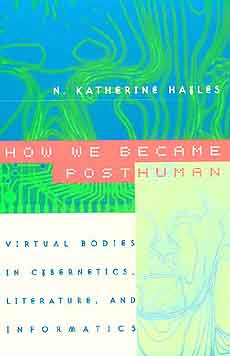 |
Katherine Hayles’ fields of interest are the relations between literature and science in the twentieth century, electronic textuality, twentieth-century American fiction, science fiction, and literary theory. Her recent book, How We Became Posthuman: Virtual Bodies in Cybernetics, Literature and Informatics, won the Rene Wellek Prize for the best book in literary theory for 1998-1999. Her current projects include two books, entitled Coding the Signifier: Rethinking Semiosis from the Telegraph to the Computer (under contract to the University of Chicago Press) and Linking Bodies: Hypertext Fiction in Print and New Media. Other publications include Chaos Bound: Orderly Disorder in Contemporary Literature and Science and The Cosmic Web: Literary Strategies and Scientific Field Models in the Twentieth Century. Articles available on-line include "Flickering Connectivities in Shelley Jackson’s Patchwork Girl: The Importance of Media-Specific Analysis," Postmodern Culture 10.2 (January 2000) (http://www.iath.virginia.edu/pmc/), and Chapter 2 from How We Became Posthuman, "Virtual Bodies and Flickering Signifiers, available at Hayles’ website, http://englishwww.humnet.ucla.edu/Individuals/Hayles/. Her awards include a Guggenheim Fellowship, two NEH Fellowships, a Rockefeller Residential Fellowship at Bellagio, and a Presidential Research Fellowship from the University of California. She has received a Distinguished Scholar Award from the University of Rochester, the Medal of Honor from the University of Helsinki, and the Distinguished Scholar Award from the International Association for the Fantastic in the Arts. She was also awarded the Academic Senate's Distinguished Teaching Award for 1999 and the Eby Award for Distinguished Undergraduate Teaching in 1999. |
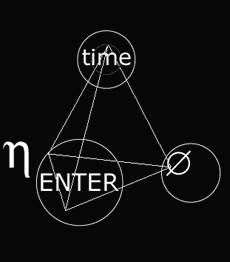 |
Vesna’s work can be defined as experimental research that creatively connects networked environments to physical public spaces. She explores how communication technologies effect collective behavior, and shift perceptions of identity in relation to scientific innovation. She completed her Ph.D. at the Center for Advanced Inquiry in Interactive Arts (CaiiA), University of Wales. Her thesis was entitled "Networked Public Spaces: An Investigation into Virtual Embodiement". Currently she is developing a large collaborative project, “notime”. “Building a Community of People with No Time” (notime) is a series of projects taking place on the net and in physical public spaces. It is conceived to raise questions about perceptions of time and identity as we overextend our personal networks through communication technologies. There are three manifestations of notime, all interconnected and networked: as a net project, a physical installation and a performance involving cell phones. Vesna has initiated and produced a number of projects that address issues of art, science and technology such as the special issue of Artificial Intelligence & Society' Database Aesthetics: Issues of Organization and Category in Art'; a CD-ROM ' Life in the Universe with Steven Hawking'. Forthcoming is a book she is co-editing with Christiane Paul and Margot Lovejoy, entitled “Context Providers". |
Respondent
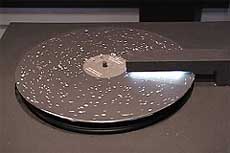 |
Ruth West is an artist with background as a molecular genetics researcher. She is currently a graduate student in the department of Design|Media Arts at the UCLA School of the Arts. Her work explores the relationship between genetics and culture, within the broader framework of the interrelationships of artistic and scientific practice. Working in predominantly computer-based media, she is also self-taught as a painter. Her work has been published in the American Journal of Human Genetics, Genomics, and the Proceedings of the National Academy of Sciences, among others. She conceived and teaches the seminar entitled, "Genetics and Culture: From Molecular Music to Transgenic Art" at the University of California, Los Angeles. The interdisciplinary course received GE accreditation in the College of Letters and Science as Honors, Humanities: Art and in the School of Arts and Architecture it received GE accreditation in Science and Social Science. Student produced artistic work from the seminar to be exhibited at the Genetics and Culture Symposium, UCLA, March 8, 2002. |